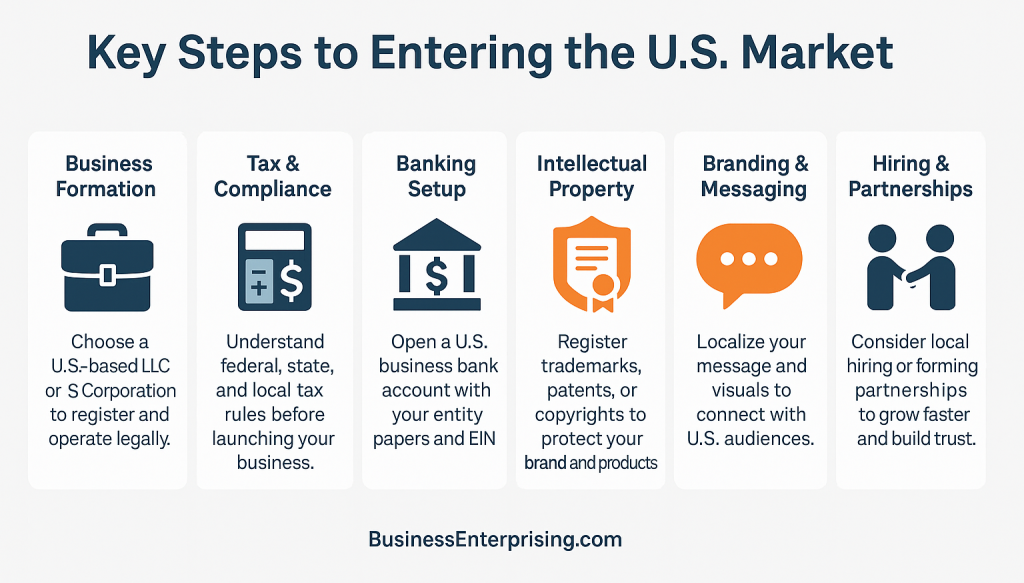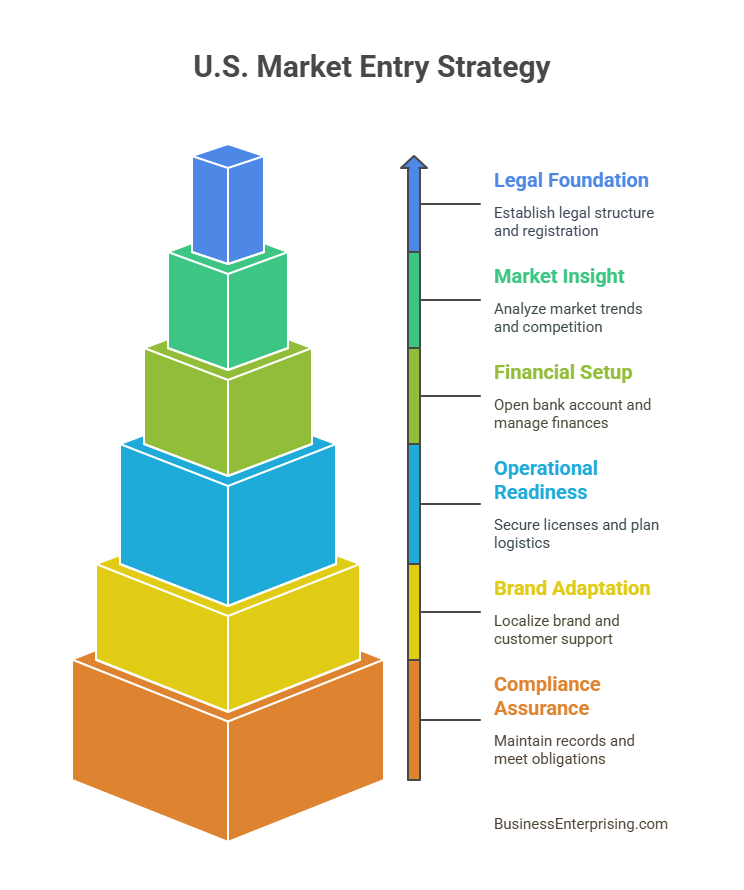 Entering the U.S. market offers new opportunities, but it also comes with added responsibilities and legal requirements. Therefore, it’s important to start with a clear plan. You’ll need to decide how your business will operate, register your entity, and prepare for compliance.
Entering the U.S. market offers new opportunities, but it also comes with added responsibilities and legal requirements. Therefore, it’s important to start with a clear plan. You’ll need to decide how your business will operate, register your entity, and prepare for compliance.
Additionally, you should understand how your structure affects taxes, banking, and liability. These factors vary depending on your state and business model. However, forming a U.S.-based LLC or C Corporation is often the first step. That gives your business legal standing and helps build trust.
You’ll also need to think about branding, communication, and customer expectations. Therefore, research your audience and adjust your marketing to match. Every market has differences that affect how your message is received. Small changes can lead to better results.
However, operations go beyond marketing and legal setup. You’ll also need to open a bank account, protect intellectual property, and possibly hire local support. Additionally, setting up reliable systems from the start makes future growth easier.
Compliance and preparation are just part of the picture. Therefore, take time to evaluate your goals and choose the right path. Doing this early can save time and reduce risk later. With each step, you move closer to building a stable and profitable U.S. presence.
The U.S. market is large and competitive. However, the right approach helps you enter with confidence. Stay focused, stay flexible, and prepare each piece carefully. The results will come from clear decisions and steady follow-through.
What is the best legal structure for a foreign company entering the U.S. market?
A U.S.-based LLC or C Corporation is often preferred for liability protection and ease of doing business.
Choosing the right legal structure matters when entering the U.S. market. It affects your taxes, liability, and how you operate daily. For many foreign companies, an LLC or C Corporation is the most practical option. These structures offer protection and flexibility without adding too much complexity.
Additionally, both entities make it easier to open U.S. bank accounts and build credit. If you plan to raise capital, a C Corporation may work better. Investors often prefer it due to clear ownership rules. However, if you want fewer formalities, an LLC might suit your needs better.
Therefore, think about your business goals before deciding. You should also consider how profits will be taxed. An LLC may offer pass-through taxation, depending on how it’s set up. A C Corporation is taxed at the corporate level, with possible taxes on dividends. That structure may still be worth it if you’re reinvesting profits.
Additionally, state choice affects your decision. Some states offer lower fees or fewer filing requirements. However, you’ll still need to register in each state where you do business. That can lead to added paperwork or ongoing costs.
You may also need a U.S. representative or registered agent. That person receives official documents on behalf of your company. Therefore, it’s smart to work with someone familiar with local requirements. Having that support can prevent delays or legal issues later on.
Taking time to choose the right structure helps you avoid problems down the road. It sets the foundation for your success in the U.S.
Do we need a physical presence in the U.S. to operate legally?
No, but having a U.S. address or local representative can improve credibility and facilitate operations.
You don’t need a physical office to operate a business in the U.S. Foreign companies can register and do business remotely. However, having a U.S. address or representative adds credibility and simplifies many practical matters. This becomes even more important when entering the U.S. market.
Therefore, many companies choose to set up a virtual office or hire a registered agent. This gives you a business address that meets legal requirements. Additionally, it helps you receive mail, official documents, and service requests without delay. That support can make your operations smoother and more professional.
Clients and partners often prefer working with a company that has a local presence. Therefore, even a small office or mailing address can build trust. It also gives you a local phone number, which may help when communicating with U.S.-based contacts.
However, not all industries need a physical setup. If your work is online or service-based, remote operations may be enough. Still, some states or industries may have specific rules. Therefore, check the local regulations tied to your business type.
Additionally, a physical presence can impact taxes and legal filings. Some states may charge fees based on where you operate. That’s another reason to consider your business structure and state of registration.
You can start small and expand as needed. Many companies begin with a virtual presence before investing in office space. As a result, you stay flexible while building trust and improving your reach.
Can foreign owners open a U.S. business bank account?
Yes, but most banks require a U.S. entity, EIN, and the owner’s physical presence to open the account.
Opening a U.S. business bank account is often necessary if you plan to operate or expand your company from abroad. Most banks require that you first form a U.S. entity. Therefore, setting up an LLC or C Corporation is usually your first step.
Additionally, you will need an EIN, which serves as your business tax ID. This is required by almost every financial institution. However, one challenge for foreign owners is that many banks also ask for your physical presence. That means you may need to visit a U.S. branch in person.
Some banks offer online account setup, but options are limited. Therefore, it’s best to plan a visit if possible. Additionally, having a U.S. mailing address or registered agent can make the process smoother. These help meet residency-related requirements, even if you are not based in the U.S.
Entering the U.S. market involves many details, and banking is one of the most important. Without a business account, you may face delays in payment processing and tax filings. Therefore, opening an account early helps avoid future complications.
You should also be prepared to provide documentation. That includes formation papers, ID, and possibly proof of address. Additionally, some banks may request extra verification steps based on your country of origin.
Start the process once your entity is formed. That way, you can begin operating as soon as the account is open. With preparation, the process is manageable and sets a strong foundation for doing business in the U.S.
What are the tax implications of doing business in the U.S.?
Foreign-owned businesses must comply with federal, state, and local tax laws, which vary by location and structure.
Taxes are a major consideration when entering the U.S. market. Foreign-owned businesses must follow federal, state, and sometimes local tax rules. These rules vary depending on where your business is registered and how it operates.
Therefore, your business structure will affect how you’re taxed. An LLC may offer pass-through taxation, while a C Corporation pays corporate tax on profits. Additionally, you may need to file annual reports and pay franchise taxes, depending on the state. Each state has its own filing deadlines and requirements.
You will also need an Employer Identification Number, or EIN. This number is required for filing taxes and opening a business bank account. Additionally, you may have to file taxes even if your business doesn’t make money right away. The IRS expects annual filings from registered U.S. entities.
However, taxes don’t stop at the federal level. Some cities and counties have business taxes or fees of their own. Therefore, it’s important to check local regulations before choosing where to register. These costs can add up and affect your bottom line.
Foreign-owned businesses may also face withholding requirements. This applies if you pay contractors, send payments abroad, or earn income from U.S. sources. Additionally, you might need to file specific forms to avoid double taxation, depending on your country.
Stay organized and document your business activity carefully. That way, you can file correctly and avoid penalties. With the right structure and a clear plan, you’ll stay compliant and avoid surprises during tax season.
How can we protect our intellectual property in the U.S.?
You must register trademarks, patents, or copyrights with the appropriate U.S. government agencies for legal protection.
Protecting your intellectual property is an important step when entering the U.S. market. It helps you secure your ideas, brand, and content. However, protection doesn’t happen automatically. You need to register your trademarks, patents, or copyrights with the proper government agencies.
Therefore, start by identifying what needs protection. Trademarks cover logos, brand names, and slogans. Patents apply to inventions and new processes. Copyrights protect written content, designs, and other original works. Each type has a different application process and legal standard.
Additionally, registering your intellectual property gives you legal rights. It helps prevent others from copying or using your work without permission. That’s especially useful if your business operates online or in multiple states. With a valid registration, you can take legal action if needed.
You should also use your IP consistently. That means using your logo, product names, or written content in the same way each time. Consistency helps build recognition and strengthens your legal claim. Additionally, monitor the market for any unauthorized use.
However, registration alone is not enough. You must take action to defend your rights if someone infringes on them. That may include sending notices or taking legal steps. Therefore, keep good records of your IP use and any registrations you complete.
Entering the U.S. market means your brand will reach a wider audience. As a result, your intellectual property becomes more valuable. Protecting it early helps you avoid costly disputes and maintain control over your business identity.
What is the most effective way to enter the U.S. market?
Start with market research, establish a U.S. entity, and consider partnerships, local hiring, or e-commerce platforms.
Entering the U.S. market takes planning, but the right steps can make it easier to get started. You don’t need to rush. Start by doing basic market research to understand your industry, competition, and target audience. This helps you avoid mistakes and focus on what matters most.
Therefore, forming a U.S. entity is a good next move. A registered business gives you access to local services and bank accounts. Additionally, it builds trust with customers and partners. You can choose between an LLC or a C Corporation based on your goals and needs.
However, having a legal entity alone is not enough. You should also think about how to reach your customers. E-commerce platforms are useful if you sell products online. Additionally, local partnerships can help you build a stronger presence. Hiring a U.S.-based representative can also speed up communication and growth.
You may want to start small and expand as you learn more. That allows you to test your ideas and adjust your strategy. Therefore, take time to measure results and listen to feedback. Every market is different, and what works at home may not work in the U.S.
Additionally, your branding and messaging may need to change. Language, tone, and visuals can influence how your product is received. Make adjustments that speak to your U.S. audience. That small effort can have a big impact on your results.
A thoughtful approach reduces risk and builds confidence. By preparing carefully, you make it easier to grow and succeed over time.
Conclusion
Entering the U.S. market requires thoughtful planning and steady execution. You don’t need to do everything at once. Instead, focus on building a strong foundation with the right structure and strategy. That approach helps reduce confusion and keeps your efforts organized.
Therefore, take time to understand local laws, taxes, and registration steps. These vary by state and can affect how you operate. Additionally, getting support from U.S.-based professionals can speed things up. They can also help you avoid delays and costly mistakes.
However, compliance alone won’t guarantee success. You must also pay attention to how your brand connects with local buyers. That means adjusting your messaging, pricing, and product if needed. Additionally, local partnerships can help you gain trust and traction faster.
You should also invest time in protecting your intellectual property. Registering your trademarks and patents early helps you avoid legal trouble later. Therefore, include this step in your setup plan.
Additionally, don’t overlook the importance of banking and finance. Set up a U.S. business account so you can receive payments and cover expenses. Most banks require legal documentation, so prepare those items in advance.
Starting small gives you space to learn and adjust. As your business grows, you can expand your team or presence. Therefore, stay flexible and open to change. With the right tools and mindset, your business will be better positioned for long-term success.



